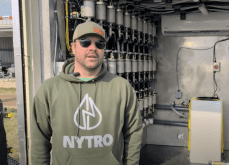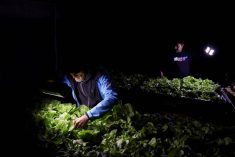A philanthropic foundation focused on improving public health now wants to improve diets by finding ways to juice up Canada’s home-grown fruit supplies.
The Weston Family Foundation on Tuesday pledged $33 million over six years for what it calls the Homegrown Innovation Challenge, a prize challenge pitting ideas against ideas with the goal of extending the growing year for Canadian produce.
Specifically, eligible teams are to be put through a series of funded phases to create, test and refine systems for growing berries — out of season and at scale.
Read Also

Feed Grain Weekly: Barley still the king of Canadian feed grains
Brandon Motz of CorNine Commodities in Lacombe, Alta. said barley is still the preferred feed grain of choice here and abroad.
Registration information for interested teams is expected to be available later this month, followed by informational webinars on March 9 and April 13. Details on the challenge are now available online.
Come 2028, the challenge process is expected to produce both an overall winner and a technology breakthrough winner, the foundation said, with the winning team receiving up to $8 million in funding.
“By catalyzing these solutions for berries, we anticipate the creation of systems relevant to a broad array of fruit and vegetable crops, helping to position Canada as a leader in this sector,” foundation chair Emma Adamo said in a release.
While greenhouse systems are already in place in Canada to grow food crops such as leafy greens, peppers and cucumbers out of season, it’s hoped the teams in this challenge can come up with sustainable technologies for crops such as strawberries and blueberries.
Beyond that, the foundation characterized the challenge as a step toward “future-proofing food production in Canada.”
Speaking at Tuesday’s announcement, Evan Fraser, director of the Arrell Food Institute at the University of Guelph, said the COVID-19 pandemic has exposed “long-standing issues” in Canadian food production and processing, such as labour availability and supply chains for inputs and equipment.
The need to create more resilient food systems in Canada also stems from climate change, he said. For example, it’s unlikely current major produce-growing areas such as California will be able to continue to supply huge volumes of crops such as strawberries and lettuce to Canadians indefinitely.
Tamara Rebanks, a director with the Weston foundation, said Tuesday the innovation challenge’s focus has been placed on berries for several reasons. For one, she said, berries are an “intrinsically Canadian” crop; for another, improving domestic berry production is a goal that’s “technically challenging, but not impossible.”
Third, she said, it’s likely that systems to improve berry production can be ramped up to apply to other crops as well.
“For instance, berries have similar requirements for pollination as tree crops but do not take as long to grow,” the foundation said. “By understanding how to extend berry pollination, there’s much that can be applied to other flowering plants, such as potatoes or melons.”
In both open-field and controlled-environment production, extending fruit growing seasons in Canada “requires solving a series of interconnected problems,” the foundation said.
“The range of these problems goes from the genetics of the plants to the analysis of pests and diseases, to finding the right levels of temperature and light required, to the need for efficient energy systems, and more.”
Putting up the funding in a challenge format gives competing teams a very specific time frame in which to develop their ideas and allows the work to be evaluated and judged all along the way, the foundation said.
“Rather than specifying what a solution must look like, challenge prizes set out a clearly defined goal, along with information on how success will be measured, and invite eligible innovators to propose how they think it could be solved,” the foundation said. “This approach allows for a wide range of solutions to be considered.” — Glacier FarmMedia Network


















